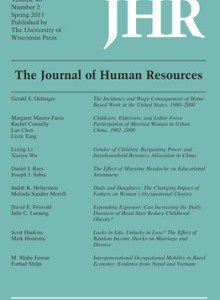
\Garcia Gomez\, P., \van Kippersluis\, H., O'Donnell, O. and \van Doorslaer\, E. (2013). Long Term and Spillover Effects of Health Shocks on Employment and Income Journal of Human Resources, 48(4):873--909.
-
Affiliated authors
-
Publication year2013
-
JournalJournal of Human Resources
We use matching combined with difference-in-differences to identify the causal effects of sudden illness, represented by acute hospitalizations, on employment and income up to six years after the health shock using linked Dutch hospital and tax register data. An acute hospital admission lowers the employment probability by seven percentage points and results in a five percent loss of personal income two years after the shock. There is no subsequent recovery in either employment or income. There are large spillover effects: household income falls by 50 percent more than the income of the disabled person.